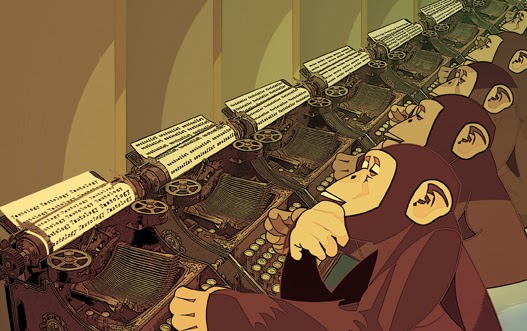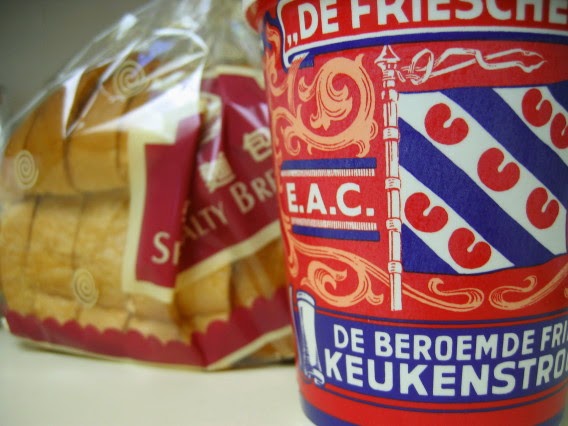I have been thoroughly enjoying a brilliant new series of podcasts on the development of English as the global lingua franca that examines its roots from proto Indo-European origins, migrations, cultural exchange and dissemination. There’s a lot of engrossing history presented through curious etymologies, and although I have heard of some of these noble linguistic lineages before there’s no exhausting the emerging connections. The thrust of the series is of course the particular dialect of the Anglo-Saxons that has survived, with much outside influences, borrowings and impositions, to the modern day—but there are also many worthy tangents explored.
The rise of the Germanic languages is an especially interesting parallel statement on world history, and understanding how they were identified by outsiders, how they identified themselves—whether or not there was a consensus on cohesion—and how language is a cultural binding agent. As you might recall from
previous adventures, one of the multiple factors that caused the collapse of the West Roman Empire was the failure of Rome to integrate and create a diaspora of the Gothic tribes that crossed the Danube into the Empire’s territory, seeking refuge from the marauding Huns. Just like the Indo-European ancestors themselves, the Huns were crossing the same plains of the Eurasian steppe to find land to support their growing population—effectively blocked in the East by the Great Wall of China. The Empire fractured into what were essentially independent Germanic kingdoms within Roman lands, with their own customs, laws and languages, with more outsiders realising that the once-powerful Empire was not in a position to stop them. The Goths and the Vandals (Wandalen) were both peoples of coastal Scandinavia who came to settle Silesia and North Africa, sacking Rome along the way. It is for this act of vandalism that the tribe is remembered but their name is the proto-Germanic source of word meaning wanderer (the same word in German and English). The association of the former tribe with a darkly brooding subculture came with the Renaissance and rediscovery of classical Greek and Roman art and philosophy that had been mostly lost to the West. One trigger that brought about the epoch was the Ottoman Empire finally breaching the Walls of Theodosius that had protected Constantinople for a thousand years and scholarship was scattered to the winds, eventually returning to Europe. Neoclassic architecture, modeled off the Romans and Greeks, came into vogue and the predominate ornate style of the Middle Ages—called the Dark Ages due to the collapse (really a coopting at this point and probably involved little wanton destruction) of Rome by these barbarous hordes—was dismissed as something
gothic and old-fashioned.
The Angles (which means crook, like an angle or a hook used in fishing and preserved in the German word Angeln for that act, and is in reference to the shape of the Danish pennisula of Jutland, their homeland, and gives us the name East Anglia and England), later merging with the Saxons (meaning Swordmen and source of the designations Essex, Wessex and Sussex for the kingdoms of the East, West and South Saxons), moved into England from the German coast region of the North Sea once Rome had retreated from the island. The fleeing romanized Britons lent their name to the province of Brittany just across the English Channel,
Mor Breizh or La Manche. The tribes that gives Germany the place-names of Bavaria and Franconia—and originally Bohemia and France from whence they came, were Celtic people. With the later
Norman Invasion of England (the Normans being Norse transplants themselves), the French language had a major impact on English vocabulary, with the name of the Frankish tribe itself having a rather stimulating history and legacy: some linguists postulate that this Gallic group was called “free” because of early treaties with the Romans that formed a confederation that made certain allowances for home-rule and in exchange for defending the Empire’s frontier, were free to cross into Roman territory, and by way of French influences, English has the word frank (freimütig), for being open or just blunt, franchise (generally, a right or privilege or the right to sell under a parent label), disenfranchised (having those rights sidelined), and what’s called franking (Frankatur) privileges, the right to print postage stamps. The Chatti tribe gave the federal state of Hessen its name, following the sound shifts of Grimm’s Law. The Alemanni settled along the Main and Rhine and their territory stretched from Alsace to Switzerland; the tribe was eventually overtaken and assumed a Frankish identity but the name, “all men”—probably a catch-all name for the various clans in this broad area, is retained in the toponym of Germany in many of the Romance languages. Even if one calls Deutschland
Germany, one might still know how to allemande right and left (the Germans supposedly did this particular move) at the ball or square dance.

A league of tribes that ganged up against the Romans when they were already going down was called the Marcomanni, and it is from the alliance of these “border men” that we have the word for march (Mark) in the sense of a frontier and the title of Marquis (
Margrave). Other Germanic tribes, that went east and south respectively, give us the name for the Burgundy region of France and the Lombardy region of Italy. One common Lombard first name was Irmen which became Amerigo once Italian speech returned and it was one certain cartographer by the name of Vespucci who demonstrated to the world that Christopher Columbus had indeed arrived in the Caribbean and not the East Indies as the explorer insisted and for whom two continents are named. Academics have the works of Ancient Roman historian Gaius Cornelius Tacitus—where the adjectives tacit and taciturn for his compact and direct writing style—for much of this source information, and aside from Julius Caesar’s personal accounts, there is very little other documentation. Consequently, every sentence has been poured over and dissected over the last six hundred years, after the sole surviving copy was discovered in the Abbey of Bad Hersfeld, of this short ethnograph. And whereas, certain comments reflective one person’s opinion or generalisation might be dismissed or taken with a grain of salt within a larger work (though this happens with the Bible and company too), selective-readers highlighted passages that unfortunately praised the Germanic race as being the purest and the noblest one amongst these savages and turned these words in dangerous directions.





























































